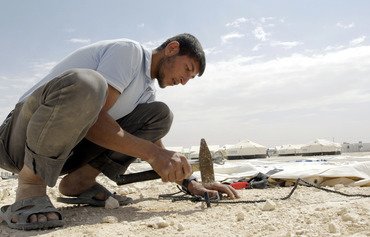In Jordan's northern Mafraq governorate, the Adaleh Centre for Human Rights Studies' legal aid unit has been working to ensure Syrian refugees have access to the justice system.
Established in 2014, the unit has been providing legal aid to Syrian refugees in Mafraq by conducting awareness sessions and offering free consultations within the framework of a new project.
The one-year project is funded by the Spanish International Co-operation for Development Agency (AECID) as part of efforts to support the rule of law and access to justice in Jordan.
In 2017, the Adaleh Centre offered services to around 750 refugees, 450 through awareness sessions and 310 of whom were provided with free legal consultations and services.
![Syrian refugee women take part in an awareness-raising session hosted by the Adaleh Centre for Human Rights Studies' legal aid unit. [Photo courtesy of Adaleh]](/cnmi_am/images/2018/10/02/14632-Jordan-Syrian-refugees-600_384.jpg)
Syrian refugee women take part in an awareness-raising session hosted by the Adaleh Centre for Human Rights Studies' legal aid unit. [Photo courtesy of Adaleh]
These services were provided by three lawyers who were recruited to file cases for the refugees without charging them any fees.
Improving access to justice
Israa Majid, a 17-year-old mother who hails from the Syrian city of Daraa and now lives in Mafraq, recently benefited from the legal unit's service.
The unit filed an alimony case against Majid's husband, after she claimed he and her in-laws had subjected her to abuse.
"As a marginalised group, we have limited access to justice," she told Al-Mashareq. "This urged me to remain silent for years about any injustices, as I know my family cannot afford to file a case in court or hire a lawyer."
"The purpose of establishing the legal aid under the Adaleh Centre for Human Rights Studies is to raise the awareness of men, women and children of their rights and duties, document violations and explore the refugee community's challenges," said the legal unit's director, Salem al-Mefleh.
"Those refugees are not only vulnerable to ask for their own rights but they are also ignorant of Jordanian laws and legislation," he said.
The unit also has worked to familiarise Syrian lawyers with Jordanian laws, as many refugees seek them out for advice, and has provided Jordanian lawyers with training on international laws in light of the Syrian crisis, al-Mefleh said.
Understanding legal rights
"Adaleh is making a change in the lives of so many refugees," said Asem Rababaa, executive director of Adaleh.
"It is offering them the knowledge they need of the Jordanian laws and their rights that are guaranteed in the legislation or memoranda of understanding signed with the Jordanian government," he told Al-Mashareq.
"This helps foster their commitment to the law, contributes to the reduction of legal violations, and protects them from being conflicted parties with the law," he said.
"Free legal aid services change refugees' lives," said AECID project manager Isidro Garcia Mingo. "They mean easier access to all human rights."
"Our lawyers, for example, help with the process of legalising marriages and births, which means an improved access to health and education," he said.
This also helps to avert future administrative and legal issues, he said.
"We are focusing on women and children refugees’ rights, and organise multiple legal awareness sessions for women and families on these issues, in addition to the legal services, as prevention is often the best remedy," Mingo said.
"Through Adaleh, we contribute to the fulfillment of one of the fundamental obligations of the Jordanian government, which is abiding by the international conventions the kingdom ratified and raising awareness of these conventions’ provisions at the national level," Rababaa said.

![The Adaleh Centre for Human Rights Studies' legal aid unit holds an awarness session for Syrian refugees in Jordan's Mafraq governorate. [Photo courtesy of AECID]](/cnmi_am/images/2018/10/02/14631-Jordan-Mafraq-legal-600_384.jpg)






Peace be upon you. I had my marriage contract made at Ramtha Court. However, there is an error in the contract. When I went to them, they didn’t want to correct it. My daughter doesn’t have a security card or a birth certificate because of the error. At the court, they told me it was my mistake and that I should bear the responsibility for it. I don’t know what I should do to correct it. Can you let me know?
Reply4 Comment(s)
Welcome, Thursday!
Reply4 Comment(s)
Please put a telephone number in case we need legal advice.
ReplyWelcome, Thursday! Welcome, Thursday! Welcome, Thursday!
Reply4 Comment(s)